 After a plethora of winter come spring columns, we yearned for something a bit different. For a slight change in tone, we have opted to post what we affectionately refer to as a "word column"... today's "word" being Pilgrim. This was originally published on July 3rd of 2012. Please enjoy. Three days of much needed rain. Nothing to do outside and so I took a few choice moments to go digging in the dictionary – the Oxford English Dictionary (OED), one of the greatest works of scholarship ever produced in the western world. No other language has a dictionary like it. I have a special fondness for this huge work (22 volumes in print), partly because I added a word to it myself, not long ago. I had been reading (on line) the text of a religious treatise written in the sixteenth century and came across an unfamiliar word. Turning to the OED online I was surprised not to find an entry for the word in question. So, I wrote an email to Oxford, mentioning the word in question and where I found it and quoting the passage in which it appeared. I sent it off, never expecting to hear more, but feeling virtuous for having sent it. Two days later I had an email from one of the staff saying that although the work I was looking at had been studied carefully long before, somehow the word I had queried had been overlooked. Although there are scads of “new” words coming into the language every day – Google as a verb for example – the word I had queried would be added to the “very small” list of old words not already in the dictionary. Long years ago, I said that I wanted the words, “Computer-illiterate” on my tombstone. Those days are gone. Now I think I’ll have “Added an OLD word to the OED.”
Just the other day I was looking up the word ‘pilgrim’ and found a whole paragraph of information just on the forms of the word starting in the 12th century. Did you know that ‘pilgrim’ descends from the Latin ‘peregrinum,’ which in turn comes from an adverb which means basically what people mean around here when they say that someone is ‘from away.’ Now all those endings like ‘-um’ got lost as the Latin language filtered down through the languages we call ‘Romance,’ like French and Spanish, but if you look at ‘peregrin’ and add an -e, you realize the peregrine falcon is a ‘pilgrim’ too - but gets its name by another route than that which produced our word ‘pilgrim.’ And, in fact, a glance in the OED for ‘peregrine’ makes it clear that this form of the word came into English about 200 years after the early forms of ‘pilgrim’ (which didn’t look much like the modern word – pilegrim, pylgreme, etc.), and ‘peregrine’ was first applied to the falcon. We take words so much for granted and use a small selection of them day by day without ever considering what we are doing. A whole science is hidden there where tongue and teeth and vocal cords and air are put together to make noises that carry meaning to other human beings. People who have an interest in this sort of thing look at words like ‘pilgrim’ and ‘peregrine’ and consider how the same word, ‘peregrinus,’ could produce not only a kind of bird, but also a pilgrim to the Holy Land. And how could the ‘r’ in ‘per-’ become an ‘l’ in ‘pil-?’ Students of language divide the sounds we make when speaking into two kinds: consonants and vowels. The vowels – a, e, i, o, and u – we know about, the consonants are the other sounds, called consonants, because they ‘sound together,’ con-sonant, with the vowels. A vowel sound can go on forever (that’s part of the reason why the doctor tells you to say ‘ah’ when he wants to look down your throat) but (most) consonants can’t. Every rule in language has exceptions. ‘R’ and ‘L’ are consonant exceptions. Most people can roll an ‘R’ (I can’t) and the sound of ‘L’ can also be prolonged until the L-sayer runs out of breath. Because those two consonants can run on like that, a witty Greek by the name of Dionysius Thrax named them ‘moist’ consonants, and the Romans added moisture and called them liquids, and the name has stuck. Like a stream crossing a meadow, though, liquid consonants can move around or even change places, as in peregrine and pilgrim. Our language can never quite pin down where an ‘R,’ for example, should go - before or after the vowel. So, we have ‘three’ with the R before the vowel, but ‘third’ with the R after the vowel. Do you say ‘comfortable’ or ‘comfterble’? In common speech. ‘L’ in ‘cavalry’ (horse soldiers) frequently becomes ‘Calvary’ (the place). Wonderful stuff, words. |
Words & ImagesWe moved to our farm in Sussex, New Brunswick from Toronto in 1977, only moving away in 2014. Archives
April 2020
Categories
All
|
